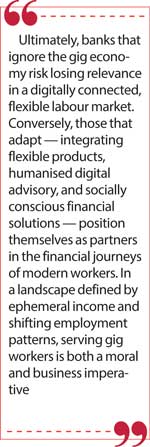Wednesday Feb 18, 2026
Wednesday Feb 18, 2026
Thursday, 13 November 2025 00:20 - - {{hitsCtrl.values.hits}}

Even highly skilled freelancers or platform-based professionals can experience dramatic fluctuations in earnings
 The modern workforce is experiencing a quiet but transformative revolution. Traditional 9-to-5 employment, once the backbone of economic planning and financial services, is no longer the dominant model in many countries. Instead, the gig economy — encompassing freelancers, ride-share drivers, delivery personnel, content creators, and other platform-based workers — has emerged as a major employment segment globally.
The modern workforce is experiencing a quiet but transformative revolution. Traditional 9-to-5 employment, once the backbone of economic planning and financial services, is no longer the dominant model in many countries. Instead, the gig economy — encompassing freelancers, ride-share drivers, delivery personnel, content creators, and other platform-based workers — has emerged as a major employment segment globally.
In Canada, recent estimates suggest that over 1.5 million individuals participate in gig work, representing a significant portion of the labour force. Across Europe, urban centres like Berlin, London, and Amsterdam have seen substantial growth in freelance and platform-based labour, while in Asia, countries such as India, Singapore, and Indonesia report millions of workers whose primary income comes from short-term, project-based engagements. Globally, gig labour contributes meaningfully to GDP, consumer spending, and innovation, yet its irregularity poses unique challenges for traditional financial institutions.
For banks, this evolution presents a strategic and operational dilemma. Traditional banking products — such as fixed-term loans, standard mortgages, and conventional savings plans — are designed for predictable, salaried income streams. These products assume regular deposits, stable cash flow, and repeatable budgeting cycles. When applied to gig workers, they often fail to accommodate financial volatility, leaving a growing segment of clients underserved or excluded.
This mismatch is not merely academic; it has tangible consequences. A delivery driver with earnings that fluctuate daily may struggle to qualify for a conventional mortgage, while a freelancer juggling multiple short-term contracts may find standard savings or investment products inflexible or irrelevant. The result is a growing cohort of financially active yet institutionally underserved clients — individuals who are visible in the economy but invisible to traditional banking frameworks.
 The challenge for banks, therefore, is to reimagine financial products and engagement strategies that acknowledge and accommodate ephemeral income, while simultaneously cultivating loyalty and trust in a client base that is mobile, tech-savvy, and highly discerning. This requires a fundamental shift in both product design and relationship management, moving from rigid, one-size-fits-all models to flexible, adaptive solutions tailored to modern work realities.
The challenge for banks, therefore, is to reimagine financial products and engagement strategies that acknowledge and accommodate ephemeral income, while simultaneously cultivating loyalty and trust in a client base that is mobile, tech-savvy, and highly discerning. This requires a fundamental shift in both product design and relationship management, moving from rigid, one-size-fits-all models to flexible, adaptive solutions tailored to modern work realities.
The challenge of ephemeral income
For gig economy workers, financial volatility is the norm, not the exception. Even highly skilled freelancers or platform-based professionals can experience dramatic fluctuations in earnings — one week may bring substantial income, while the next leaves them with little or nothing. This irregularity creates a set of unique challenges that traditional banking products are ill-equipped to address.
Budgeting difficulties
Without consistent inflows, setting aside savings, planning monthly expenses, or preparing for emergencies becomes highly complex. A driver for a ride-share platform may earn $ 800 one week and $ 2,500 the next, making it difficult to anticipate cash flow and allocate funds for rent, utilities, or tax obligations. Unlike salaried employees, whose predictable income allows for structured budgeting, gig workers must constantly adjust, often relying on ad hoc methods or digital tools that may not integrate with formal banking systems.
Credit access barriers
Traditional credit scoring models penalise irregular income, even if the individual’s total earnings are substantial over time. A freelancer who earns a six-figure annual income through multiple short-term contracts may struggle to qualify for a mortgage or a personal loan because banks typically prioritise steady monthly deposits. This mismatch leaves gig workers underserved and financially constrained, often turning them toward fintechs or alternative lenders that use alternative data points for credit assessment.
Liquidity gaps
 Gig work is also subject to platform-specific delays, cancellations, or seasonal fluctuations, creating short-term liquidity challenges. A content creator awaiting payment from multiple clients, or a delivery driver hit by a temporary reduction in orders, may find themselves unable to cover essential expenses. These gaps not only induce stress but also increase the risk of late payments, overdraft fees, or reliance on high-cost credit solutions.
Gig work is also subject to platform-specific delays, cancellations, or seasonal fluctuations, creating short-term liquidity challenges. A content creator awaiting payment from multiple clients, or a delivery driver hit by a temporary reduction in orders, may find themselves unable to cover essential expenses. These gaps not only induce stress but also increase the risk of late payments, overdraft fees, or reliance on high-cost credit solutions.
Implications for banks
These challenges are not just operational—they are strategic opportunities for banks. By failing to design products and services tailored to ephemeral income, banks risk:
The key insight is clear: serving gig economy clients requires rethinking traditional assumptions about income, risk, and product design. Banks that recognise the realities of ephemeral income can not only mitigate attrition but also cultivate deep, lasting relationships with a fast-growing and influential segment of the modern workforce.
Innovative banking solutions for gig workers
Serving gig economy clients effectively requires reimagining traditional financial products to fit irregular, unpredictable income streams. Banks that proactively address ephemeral earnings not only provide socially responsible support but also unlock long-term loyalty and revenue opportunities. Global examples demonstrate how creative approaches can transform ephemeral income into financial stability.
1. Dynamic savings and micro-deposits
Traditional monthly savings plans are often incompatible with fluctuating earnings. Instead, banks can offer automated micro-savings tools that allocate a small percentage of daily or weekly income into dedicated accounts. This allows freelancers and platform workers to accumulate savings gradually without compromising cash flow.
In the UK, neo-banks like Monzo and Starling have successfully implemented “round-up” and micro-deposit features. For instance, a freelancer earning £ 250 one week might automatically transfer £2–£5 into a savings goal, gradually building an emergency fund without the stress of fixed monthly contributions.
2. Flexible credit lines
Rigid repayment schedules are a major barrier for gig workers. Instead, revolving or short-term credit products that adjust repayment amounts based on income patterns can offer crucial liquidity without penalising variability.
In India, fintechs such as KreditBee provide micro-loans with repayment schedules aligned to real-time earnings, mitigating default risk while meeting immediate financial needs. Similarly, in North America, some challenger banks link credit limits and repayment flexibility to direct deposits from gig platforms, providing a safety net without overextending the client.
3. Income-sensitive financial planning
 Digital tools can now analyse irregular income patterns and deliver personalised financial guidance. Predictive algorithms can help gig workers anticipate lean months, plan essential payments, and optimise tax obligations.
Digital tools can now analyse irregular income patterns and deliver personalised financial guidance. Predictive algorithms can help gig workers anticipate lean months, plan essential payments, and optimise tax obligations.
For example, a Canadian freelance designer may receive insights suggesting how much to set aside each week for anticipated tax liabilities or how to smooth spending across months with volatile project income. This approach enhances confidence, reduces stress, and builds trust in the bank.
4. Insurance and safety nets
Income volatility exposes gig workers to financial shocks from illness, accidents, or platform disruptions. Banks can integrate income protection, short-term disability coverage, or tailored health insurance linked to platform earnings.
In Southeast Asia, digital wallets like GrabPay and Gojek Pay combine micro-insurance products with earnings-tracking features, allowing drivers and delivery workers to maintain financial security despite unpredictable income. By providing these safety nets, banks demonstrate empathy and social responsibility, while embedding gig workers into their long-term client base.
Global perspectives: How banks are serving ephemeral income
The gig economy is a global phenomenon, and banks worldwide are experimenting with innovative approaches to serve workers with variable income. Examining different regions reveals how financial institutions are adapting to modern work realities, transforming ephemeral income from a challenge into an opportunity.
North America
In the US and Canada, fintech platforms have integrated directly with gig platforms such as Uber, DoorDash, Etsy, and Upwork. This allows real-time monitoring of earnings and enables banks to design dynamic financial products tailored to income volatility. For instance:
These innovations not only help gig workers manage cash flow but also foster trust and engagement, ensuring that banks remain relevant in a landscape increasingly dominated by fintech alternatives.
Europe
European neo-banks are experimenting with income smoothing solutions to help freelancers and platform workers maintain predictable spending power despite irregular earnings. For example, Bunq offers features that allow users to pre-plan fixed expenses while adjusting discretionary spending according to actual income.
Other challenger banks, such as N26 and Revolut, combine automated savings, micro-investing, and instant alerts to help gig clients stay on top of financial goals. These strategies demonstrate that behavioral tools and digital nudges can mitigate the stress of income volatility, making financial management more intuitive.
Asia
In Southeast Asia, digital wallets and super-apps like Gojek Pay and GrabPay integrate flexible savings, micro-investment, and lending options into everyday earnings management for gig workers. Drivers, delivery personnel, and freelancers can:
These solutions enhance financial inclusion, providing urban gig workers with banking access and credit-building opportunities that were previously out of reach.
Key insight
Across continents, the common thread is that ephemeral income is not a barrier — it is an opportunity for innovation. Banks that understand the realities of gig work, and adapt their products accordingly, can deepen relationships, increase loyalty, and expand their client base among a segment that is growing rapidly and increasingly influential in the global economy.
Why serving gig workers matters
The gig economy is more than a passing trend — it represents a structural shift in global labour markets. By 2030, studies project that a significant portion of the workforce across North America, Europe, and Asia will earn at least part of their income from gig or freelance work. For banks, this evolution is both a challenge and an opportunity: serving gig workers effectively today can translate into long-term strategic advantage tomorrow.
1. Builds loyalty early
Supporting gig workers with tailored products and advisory services fosters loyalty at the outset of their financial journey. Consider a ride-share driver in Toronto who uses a bank’s dynamic savings tool and flexible credit line. As their earnings grow or diversify, the same institution is already embedded in their financial habits. By recognising and accommodating ephemeral income early, banks convert a historically transient client base into long-term, stable customers.
2. Demonstrates social responsibility
Banks that design products for gig workers signal empathy, inclusivity, and innovation. By acknowledging the realities of irregular income, platform-dependent work, and modern labour trends, financial institutions enhance their reputation as socially responsible actors. For instance, digital wallets in Southeast Asia, such as GrabPay and Gojek Pay, integrate micro-insurance and savings features for gig workers, reflecting an understanding of their unique vulnerabilities. This approach builds trust, credibility, and brand loyalty, extending beyond transactional relationships.
3. Unlocks revenue opportunities
Tailored financial solutions for gig workers can also unlock new revenue streams. Flexible credit lines, micro-loans, income-sensitive advisory services, and micro-investment products cater directly to the unique financial behaviours of ephemeral earners. Moreover, the adoption of predictive analytics allows banks to anticipate client needs, increasing engagement and cross-sell potential without intrusive marketing. In effect, by serving a historically underserved segment, banks can generate meaningful financial returns while meeting real client needs.
The strategic imperative
Ultimately, banks that ignore the gig economy risk losing relevance in a digitally connected, flexible labour market. Conversely, those that adapt — integrating flexible products, humanised digital advisory, and socially conscious financial solutions — position themselves as partners in the financial journeys of modern workers. In a landscape defined by ephemeral income and shifting employment patterns, serving gig workers is both a moral and business imperative.
A call to action
Banks can no longer treat one-size-fits-all products as sufficient. Ephemeral wealth requires ephemeral solutions — products and services that flex with income, provide real-time insights, and integrate both digital convenience and optional human guidance.
In this new era, the institutions that adapt, innovate, and empathise will not only serve gig workers more effectively but will also capture the loyalty of a generation of clients whose income may vanish overnight — but whose long-term financial potential is enormous.
(The writer is a seasoned banking professional, financial educator, and writer with over 15 years of experience in the banking and finance industry. Currently he is a licenced professional banker with a leading financial institution in Canada and a former lecturer at the Institute of Bankers of Sri Lanka (IBSL). He draws on extensive experience gained from two of Sri Lanka’s foremost commercial and development banks, where he held senior managerial positions. Kasun possesses a multidisciplinary educational background spanning business administration, management accounting, human resources, and marketing. He writes extensively on the evolving intersection of finance, ethics, and human behaviour—advocating for more thoughtful and sustainable approaches to financial well-being.)